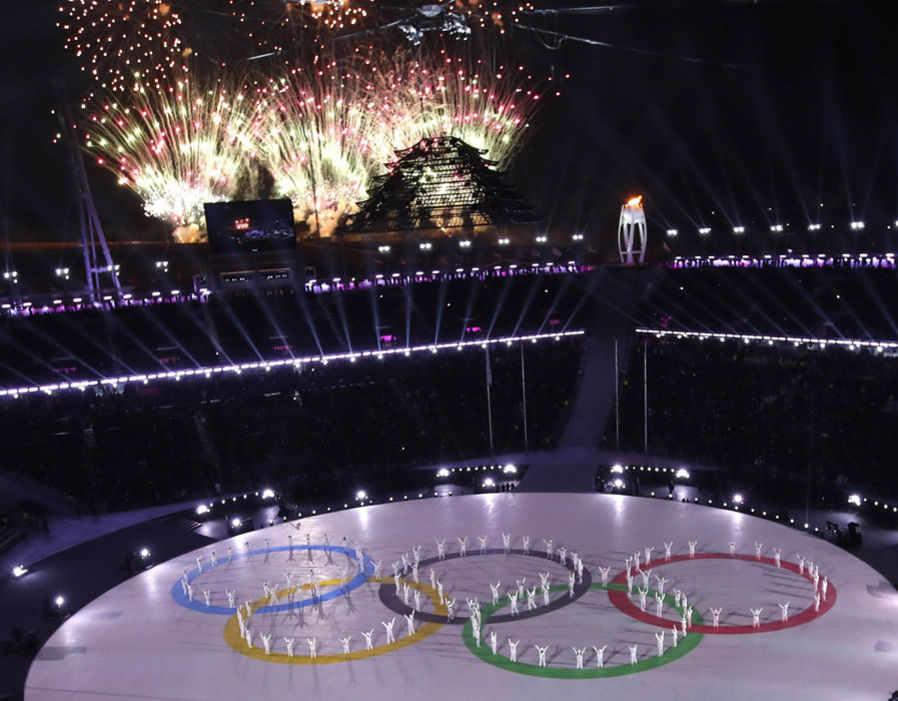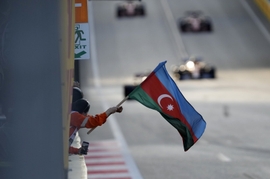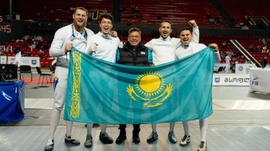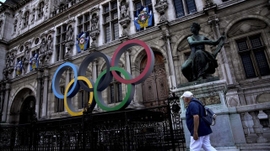Athletes from two Caspian countries grabbed 18 medals at the XXIII Olympic Winter Games, which came to a close today in Pyeongchang, South Korea.
Russian athletes, technically known as “Olympic Athletes from Russia” (OARs), ranked seventh in the overall medal count that tracked winners from the 90 participating countries in this year’s winter games. Seventeen medals were won in Cross-Country Skiing, Hockey, Skeleton, Short Track, Figure Skating and Freestyle Skiing.
Due to a ban on Russia imposed by the International Olympic Committee (IOC) after doping scandal, Russian athletes in this year’s Olympics technically did not represent Russia. Instead they participated in the games as athletes under a neutral flag, or that of the IOC.
For the first time in 26 years, the OARs won a gold medal in men's hockey. The last time that happened was in 1992, in Albertville, France. A goal scored by Kirill Kaprizov in over-time on Sunday afternoon made the Russian team the winner, 4-3, over Germany.
“It was the craziest game ever,” said Russian forward Ilya Kovalchuk, the ex-NHL star and the top-scoring Russian Olympian of all time. “When we had the penalty with two minutes to go, I honestly thought we won’t be Olympic champions.”
The OARs also grabbed gold in women’s figure skating when Alina Zagitova, age 15, scored 239.57 points on Friday. Zagitova became the second-youngest women’s skater to win Olympic gold.
Although Russia athletes watched the five-ringed Olympic flag being raised instead of the Russian flag, and heard the Olympic hymn played instead of the Russian anthem, fans chanted Zagitova's name and waved the Russian tricolor at the medals ceremony.
“It doesn’t matter what the circumstances are. People know who we are. Today, we proved ourselves here,” said Evgenia Medvedeva, who took the silver medal with 238.26 points while skating to Tolstoy’s tragedy “Anna Karenina.”
Russia’s standing was disputed throughout the games, and there had been hope by OARs that by the closing ceremony Russia would be officially reinstated into the Olympics. But the IOC voted to maintain the ban on Russia, meaning the Russians could not wave their flag at the close of the games and during Sunday’s ceremony.
The IOC’s final decision was influenced by the fact that one Russian participating in the games, curler Aleksandr Krushelnitckii, tested positive for the banned substance meldonium. He and his wife, Anastasia Bryzgalova, voluntarily gave back the medals they won during the doubles curling event.
Meanwhile, Kazakhstan clinched one bronze medal in Freestyle Skiing. Yulia Galysheva performed with a broken arm in the women’s mogul skiing event.
“This is the merit of all of Kazakhstan, not only of my family, coaches. This is a medal of our country,” Galysheva said after her performance.
French skier Perrine Laffont took gold and Canada’s Justine Dufour-Lapointe won the silver.
Kazakhstan ranked 28th overall in the medal standings. Galysheva’s bronze was Kazakhstan’s eighth medal ever since the country began sending a national team to the winter Olympics, following its independence from the USSR in 1991.
Azerbaijan and Iran sent athletes to the games, however none won medals. Turkmenistan was the Caspian region’s only country to not send a delegation to the games in South Korea.
The XXIII Olympic Winter Games kicked off on February 9, and saw nearly 3,000 athletes from 90 countries compete in 15 winter sports.







 Iran's senior military leaders described the drone and missile attack on Israel on April 14 night as “successful".
Iran's senior military leaders described the drone and missile attack on Israel on April 14 night as “successful".
 The number of evacuees from flooded areas in Kazakhstan has reached 97,852 people, including about 32,856 children since March 27.
The number of evacuees from flooded areas in Kazakhstan has reached 97,852 people, including about 32,856 children since March 27.
 Azerbaijan officially unveiled the logo for the upcoming 29th session of the Conference of the Parties to the United Nations Framework Convention o...
Azerbaijan officially unveiled the logo for the upcoming 29th session of the Conference of the Parties to the United Nations Framework Convention o...



